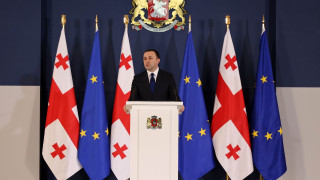FactCheck continues to review the accuracy of the Prime Minister’s 2023 Government Performance Report. We have investigated four more statements in this part. Refer to our previous article for information on the other statements.
Statement 1: “The wages of employed people were approximately GEL 750 in 2012. The amount has reached GEL 1,850, indicating a two-and-a-half fold increase in the average monthly wages of employed persons over the past 11 years.”
Verdict: HALF TRUE
The mean gross monthly earnings (pre-tax) of employees constituted GEL 713 in 2012 and GEL 1,543 in 2022. The average for the initial three quarters of 2023 amounted to GEL 1,792 (GEL 1,717 in Q1, GEL 1,805 in Q2, GEL 1,855 in Q3), implying a two-and-a-half -fold rise as compared to the 2012 baseline value (GeoStat began to publish quarterly data in 2014, therefore it was impossible to compare the first half of 2023 to that of 2012).
The decisive impact of higher wages lies in the difference in the quantity of goods and services attainable for a consumer with the aforementioned higher income.
Whilst the nominal earnings have increased two-and-a-half times, the real income of individuals has not, in fact, increased by the same amount. The purchasing power of the average wage, with respect to inflation, has surged merely by 1.53 times, amounting to a 53% increment.
Graph: Monthly Earnings of Employed Persons, GEL

Source: National Statistics Office of Georgia
The data represent wages prior tax deductions; thus, the net value of the mean wage diminishes from GEL 1,792 to GEL 1,405 when factoring in pension contributions and income tax. Furthermore, the actual wages of a considerable portion of employed individuals are below the average value. Although the average monthly earnings were GEL 1,543 (net – GEL 1,210), the median earnings were 33% less at GEL 1,040 (net – GEL 815) in 2022. Refer to FactCheck’s article for more comprehensive information.
Statement 2: “Pensions will once again rise in 2024; pensioners above the age of 70 will receive GEL 415 and the pension of those residing in mountainous regions will become GEL 500. Pensioners below the age of 70 will get GEL 315 and GEL 380 if they reside in the mountainous regions. For reference, the 2012 pension was GEL 125.”
Verdict: MOSTLY TRUE
Pensions are stratified with respect to age groups and geographic locations. According to the reported 2024 budget project, the pension for individuals under the age of 70 will increase to GEL 315 whereas the amount that pensioners above the age of 70 receive will rise to GEL 415. Pensioners residing in mountainous regions under the age of 70 will receive GEL 380 and those above the age of 70 will receive GEL 500.
In 2012, pensions varied between GEL 110 for pensioners below the age of 67 and GEL 125 for pensioners above the age of 67 when the Georgian Dream came to power.
The reduction in the value of the purchasing power of the currency over time due to inflation is a crucial factor that should be accounted for whilst analysing pensions or any other sources of income over the longer term. Consequently, income is categorised in nominal and real terms. Nominal income represents the net value in a specific monetary unit whereas real income is the real wealth adjusted for inflation.
Although the 2024 real pension has indeed surged compared to that of 2012, the extent of the increase is not as substantial as initially suggested by the nominal value. A pensioner above the age of 70 will be able to purchase the same quantity of products in 2024 with GEL 415 as they could with GEL 245.5 in 2012 in real terms. The real 2024 pension for individuals above 70 would be equivalent to GEL 186.4 at the baseline 2012 prices. Therefore, the real pension increased nearly 1.7 times for people under the age of 70 and 1.9 times for people over the age of 70 in 2024 as compared to 2012 (refer to FactCheck’s article for further information).
Thus, whilst the data stated by the Prime Minister are factually correct, he also seeks to demonstrate exaggerated figures of pension growth. Despite numerical accuracy, the real growth is not as impressive as initially perceived. Thus, FactCheck concludes that the Prime Minister’s statement is MOSTLY TRUE albeit lacking significant clarification.
Statement 3: “Wine exports have increased by USD 187 million as compared to 2012, reflecting a 290% rise over the past 11 years. Even in the current year, wine exports have already reached USD 241 million based on the 11-month data.”
Verdict: MOSTLY TRUE.
The value of Georgian wine exports reached USD 253 million in 2022, marking a substantial increase from the USD 71 million recorded in 2012. The increase during the aforementioned time frame amounted to USD 182 million, constituting a 256% surge. However, the Prime Minister presents slightly exaggerated values.
As for the ongoing year, wine valued at USD 241 million has been exported from Georgia over the prior 11 months.
Table: Georgian Wine Exports in 2012-2022, USD Million, Million Bottles

Source: National Statistics Office of Georgia
Russia unchangeably remains the predominant market for exported Georgian wine, accounting for 64% of wine exports in 2022 and 65.5% in the first 11 months of 2023.
Notably, the output of the analysis of wine exports data shows correlation between fluctuations in the export volume of Georgian wine and Russia’s influence.
During the analysis timeframe, Russia’s share in total exports hit its lowest mark at 34% in 2012 due to an embargo (see FactCheck’s article) but exports resumed in June 2013. It was exactly due to the lifting of the embargo on Georgian wine in Russia that Georgian wine exports surged significantly in 2013-2014 (128 million in 2013, 185 million in 2014). Conversely, Russia was the reason why Georgian wine exports reduced in 2015 as the unstable situation in Russia and Ukraine significantly impacted Georgian wine exports, consequently reducing it by 39% (USD 96 million). The subsequent threats from Russia to impose sanctions on Georgian products following the events of 20 June 2019 once again underscored the impracticality of relying on Russia as a trade partner. This trade relationship depends on Russia’s malign political aims. A similar argument can be drawn concerning Russia’s decision to lift ban on airline flights to Georgia.
Furthermore, recent announcements from Russia regarding the supervision of manufacturing technologies for imported wine products (source: bpn) highlight the risks associated with depending on Russia as a primary trade partner. As noted above, Russia placed embargo on Georgian wine due to the low quality of Georgian wine in 2006. It is hard to determine the outcome of the current measures and a similar situation could once again take place as it did 17 years ago. Consequently, despite the efforts for market diversification, the aforementioned decision could nevertheless significantly harm Georgian wine exports given that Russia’s share is still 64%.
Therefore, the Georgian government should aim to reduce economic dependence on Russia. However, having analysed Georgian wine exports, the opposite picture can be observed – we are increasing dependence on Russia rather than reducing it. A higher reliance on the unstable and unpredictable Russian market will bring Georgia neither economic nor political benefits in the short or the long runs.
Thus, FactCheck concludes that the Prime Minister’s statement is MOSTLY TRUE.
Statement 4: “Georgia has earned a position in the top ten amongst 179 countries for its ten-year long progress in democracy in the Democracy Report. This is all due to the efforts made over the past 11 years.”
Verdict: MOSTLY FALSE
The Varieties of Democracy Institute (V-Dem), a research centre for democracy headquartered at the V-Dem Institute in Sweden in the Department of Political Sciences at the University of Gothenburg, released its seventh annual report in 2023. V-Dem stands as one of the largest projects globally dedicated to democracy.
Georgia demonstrated progress in two indices out of the six in the report framework, namely the Liberal Democracy Index (LDI) and the Electoral Democracy Index (EDI).
Georgia ranked amongst the top 15 countries that have exhibited a considerable growth in the Liberal Democracy Index. Other countries alongside Georgia that also increased their performance regarding liberal democracy are the Seychelles, Malawi, Nepal, Equador, etc. The countries leading the list are as follows: Denmark, Norway, Switzerland, Estonia, etc. Georgia currently holds the 61st position in the rankings of liberal democracy but stood at a better position in 2017 at 56th.
An analogous trend is observed in the electoral democracy index (EDI) where Georgia ranked in the top ten countries displaying progress in the democratisation index over the span of the last decade. The list of the aforementioned ten countries are as follows: the Seychelles, Georgia, Nepal, Equador, Gambia, Armenia, Sri Lanka, Honduras, Fiji and Madagascar. Denmark, Switzerland, Sweden, Norway and others once again lead the rankings out of the 175 evaluated countries. Similar to the above index, Georgia’s position has worsened, now ranking 60th as compared to its 2017 position of 40th.
A majority of the ten countries showcasing progress in the EDI index used to be autocratic as opposed to Georgia as of 2012 according to the organisation’s evaluation. As for Georgia, the country “was already classified as an electoral democracy in 2012 but has improved further.” Moreover, the report additionally highlights ten countries that have advanced over the last three years such as Gambia and the Seychelles. However, Georgia does not appear amongst these ten countries. Furthermore, analysing the ten-year tendency, Georgia’s advancements reached its maximum in 2017-2018 but started to decline thereafter, an observation consistent with V-Dem’s previous reports.
Considering all of the above, the Prime Minister’s statement regarding the ten-year long democratisation progress holds some truth. Whilst it is true that Georgia indeed underscored significant achievements regarding democracy over the past ten years, the PM’s statement nevertheless ignores the decline since 2017 which would have led to different impressions. Particularly, Georgia’s positions have worsened since 2017 and was not stated amongst the ten countries underscoring progress in the last three years. Thus, FactCheck concludes that the Prime Minister’s statement is MOSTLY FALSE.








